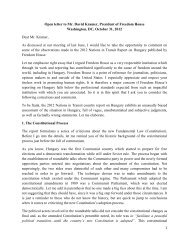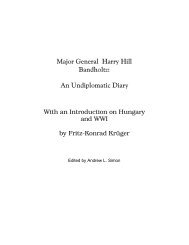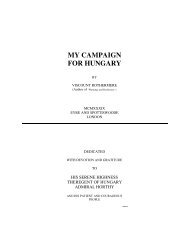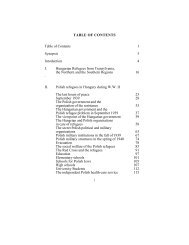The Fate of Western Hungary 1918-1921 - Corvinus Library ...
The Fate of Western Hungary 1918-1921 - Corvinus Library ...
The Fate of Western Hungary 1918-1921 - Corvinus Library ...
Create successful ePaper yourself
Turn your PDF publications into a flip-book with our unique Google optimized e-Paper software.
Austrian subversion. <strong>The</strong>y continually removed the Austrian posters urging the<br />
vote against <strong>Hungary</strong> and prevented the distribution <strong>of</strong> flyers. At the same time,<br />
they placed Hungarian material on the streets. <strong>The</strong> students also mounted a<br />
defense along the new border and at the new border railway stations against the<br />
smuggling in <strong>of</strong> publications popularizing Austria and flyers. <strong>The</strong>y searched<br />
most thoroughly incoming trains, wagons and passengers, confiscating<br />
thousands <strong>of</strong> Austrian flyers and wall posters, arresting numerous persons<br />
active in conducting Austrian political mobilization. Traffic at the train stations<br />
was continuously kept under surveillance – for months, the student / reserve<br />
<strong>of</strong>ficers were the stationmasters – and the students were also in command <strong>of</strong> the<br />
home guard units. 493<br />
<strong>The</strong> local press loyal to <strong>Hungary</strong> – the German-language Christliches<br />
Oedenburger Tagblatt (Christian Newspaper <strong>of</strong> Sopron) and Sopronvármegye<br />
(Sopron County) – asserted the advantages <strong>of</strong> staying with <strong>Hungary</strong>. Among<br />
other things, the press stressed that cross-border traffic would be easier, the<br />
Hungarian government will stimulate the economy, the German-language<br />
population will continue to be able to use freely its mother tongue, foster its<br />
culture. In the previously quoted report by Villani, the expectation was that the<br />
better-<strong>of</strong>f citizenry, the tradesmen and craftsmen and intellectuals, who would<br />
remain loyal to the country in the plebiscite. A part <strong>of</strong> the locals who worked in<br />
Austria were under the influence <strong>of</strong> the Hungarian Communist – Social<br />
Democrat refugees in Vienna and behaved with hostility toward <strong>Hungary</strong>. <strong>The</strong><br />
well-to-do Protestant farmers tended to side with Austria, saying they will be<br />
able to sell their produce there for higher prices. Hungarian reasoning tried to<br />
counter this group / argument by pointing out that the situation <strong>of</strong> Austria’s<br />
economy is terrible, the money devalues, and great gains have been made in the<br />
country by the Communists. At the time, these were all too real facts. Of the<br />
settlements to hold the referendum, Ágfalva, Balf, Fertőrákos, Harka and<br />
Sopronbánfalva were anti-Hungarian, and seemingly impossible to win over.<br />
Hungarian propaganda here intimated to the locals that, in the case <strong>of</strong> an<br />
Austrian win, rebels would attack the villages. <strong>The</strong> people <strong>of</strong> Fertőboz,<br />
Kópháza and Nagycenk were decidedly in favor <strong>of</strong> staying with <strong>Hungary</strong>. 494<br />
It soon became apparent that assembling the list <strong>of</strong> eligible voters posed the<br />
greatest problem. As we have written, the roll <strong>of</strong> voters was based on the<br />
February 1920 National Assembly election lists but that was two years old and<br />
Sopron and vicinity experienced a lot <strong>of</strong> vicissitudes in the intervening time.<br />
All eight <strong>of</strong> the electoral committees found that the lists were out <strong>of</strong> date. One<br />
<strong>of</strong> the main reasons was that the civic authorities were only given eight days by<br />
the Entente Mission to update the rolls. 495 <strong>The</strong> Austrian government<br />
immediately attacked the process, saying that persons who fled from the rebels<br />
were not on the lists, while hundreds were being enumerated – according to<br />
493 Villani, 1923, op. cit., p. 26.<br />
494 Ibid, pp. 23–29.<br />
495 Ibid, pp. 20–21.<br />
192
















